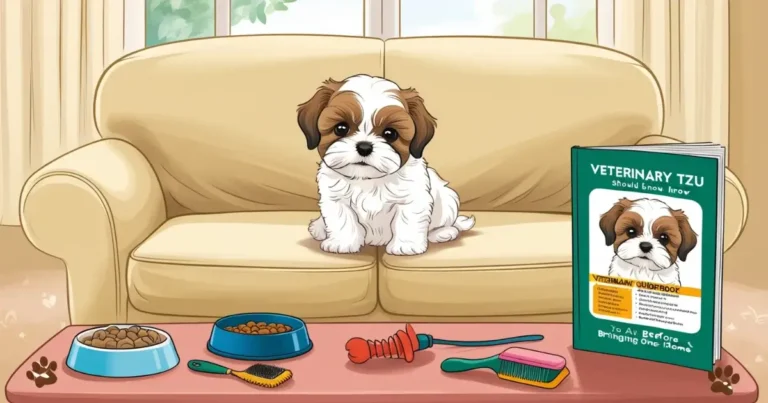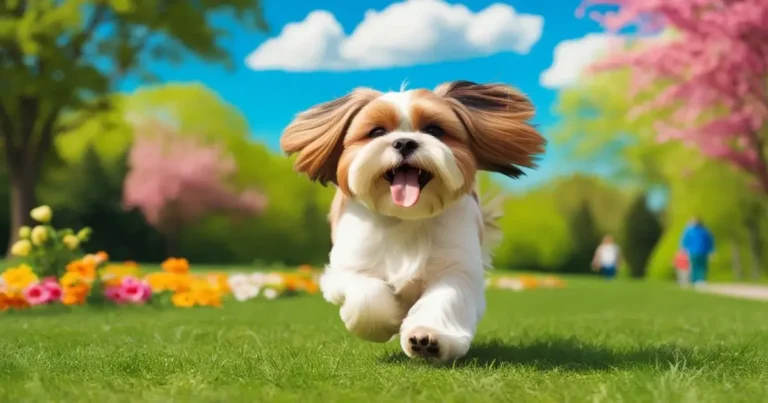Ultimate Guide to Shih Tzu Potty Training: Quick Success
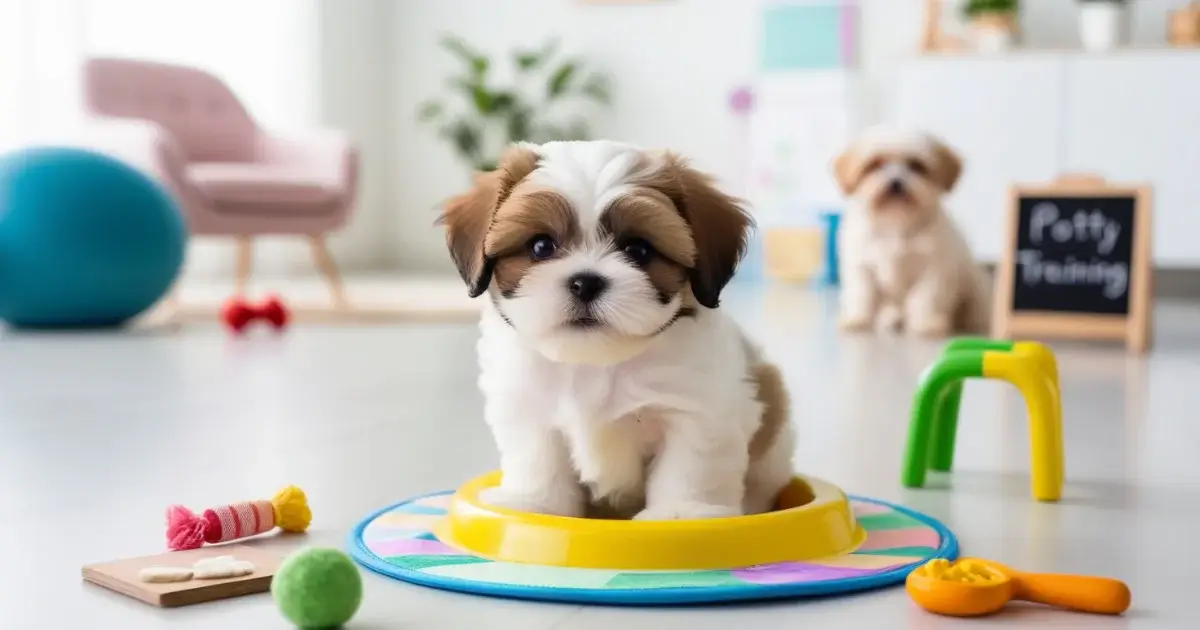
Potty training your Shih Tzu puppy can be challenging, but with the right approach, it becomes manageable. Every puppy is unique, and their potty training journey depends on consistency, patience, and positive reinforcement. This guide will walk you through potty training tips for Shih Tzu puppies and provide actionable steps to establish a routine.
Table of Contents
Understanding the Basics of Shih Tzu Potty Training
Why Patience is Key in Potty Training
When doing Shih Tzu potty training, patience is the golden rule. Puppies don’t understand human language, much like someone speaking in a foreign language. Imagine hearing gibberish while being scolded—it’s confusing and overwhelming. That’s how your puppy feels when you punish them for accidents.
“Use a positive and encouraging tone. Puppies can sense kindness, and they respond better to it,” I’ve learned through personal experience. Spend time understanding their needs instead of getting frustrated.
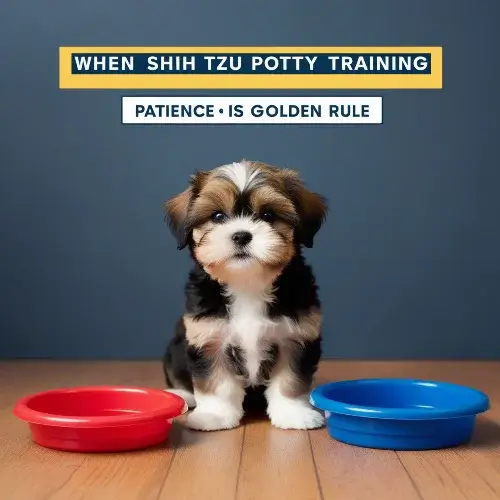
Why Traditional Punishments Don’t Work
Punishments like spanking, yelling, or confining a puppy to their crate for accidents don’t solve the problem. These actions only create fear. Instead, focus on building trust through consistent and gentle training methods.
“Success lies in repetition, not reprimand. Patience builds trust,” I often remind myself. This mindset sets the foundation for effective training.
The Importance of Establishing a Routine for Your Shih Tzu
Chalk Out a Schedule Based on Your Puppy’s Natural Cycle
Shih Tzus thrive on routines. Their daily activities—eating, sleeping, and playing—follow a predictable cycle. Puppies often need to relieve themselves after waking up, finishing meals, or playing.
Here’s a simple tip:
- Take your puppy outside every hour, especially after meals and naps.
- Stay consistent with their potty breaks.
“Routine creates predictability, which is key to effective puppy potty training,” I’ve found through years of training.
Set Fixed Feeding and Potty Times
Predictable feeding times help regulate your puppy’s digestive system. Avoid feeding at irregular hours or overfeeding, as this can lead to unpredictable accidents.
“Stick to a schedule. When your puppy eats at the same time daily, potty training becomes simpler,” I always suggest.
Identifying Your Puppy’s Signals
Puppies communicate through their behavior. Signs that your Shih Tzu needs to go include sniffing the floor, circling, or whining. Recognizing these cues early can prevent accidents indoors.
“Every puppy gives signals. Training starts with learning to observe them,” I’ve realized over time.
Positive Reinforcement Techniques That Work Wonders
Teaching Potty Commands
Using clear and consistent commands makes Shih Tzu potty training easier. For example, when taking your Shih Tzu outside, say “go potty” in a kind, encouraging tone. Repeat this command every time they are about to relieve themselves.
“Consistency builds association. With enough practice, your puppy will potty on command,” I’ve experienced firsthand.
Rewarding Good Behavior
Positive reinforcement is a powerful tool. Celebrate your puppy’s success with a cheerful “good boy!” or “good girl!” Offer treats or pats to make the experience rewarding.
Here’s what works:
- Use high-pitched, happy tones when praising.
- Reward immediately after they potty outside.
“Puppies thrive on positivity. Your joy motivates them to do better,” is a lesson I always remember. However, avoid using potty words interchangeably with other commands to prevent confusion.
Common Challenges in Potty Training Shih Tzu Puppies
Addressing Excited Urination
Excited urination is common in Shih Tzu puppies. They might pee when greeting people or during playtime. To manage this, take them outside before exciting situations like meeting guests.
“Preparation prevents accidents. Anticipate their excitement and redirect it outdoors,” I’ve found helpful over the years.
Overcoming Resistance to Outdoor Pottying
Some puppies resist relieving themselves outside, choosing instead to potty indoors. This can be frustrating, but it’s solvable with patience. Spend more time outdoors with your puppy and create opportunities for success.
Here are some tips:
- Increase the duration of outdoor trips.
- Reward them the moment they potty outside.
“If they resist, don’t rush. Extend their outdoor time until they get it right,” is advice I live by during tough training days.
Tips to Maintain a Healthy Potty Training Routine
Consistency in Location
Designating a specific potty area is crucial. If you have a yard, introduce your puppy to a particular spot early on. Always accompany them to ensure their safety and reinforce their routine.
“Consistency simplifies potty training. Familiar places make puppies feel secure,” I’ve noticed through practice.
Avoid Common Mistakes
Avoiding these pitfalls will save you time and effort:
- Overfeeding: Stick to measured portions to regulate their bathroom needs.
- Leaving the door open: Don’t let them wander unsupervised; they might get confused.
- Punishing accidents: Stay calm. Accidents are part of the learning process.
- Restricting access to rugs or carpets: Puppies may confuse these with grass.
“Patience is your biggest ally. Frustration leads to setbacks,” is my advice to every dog owner.
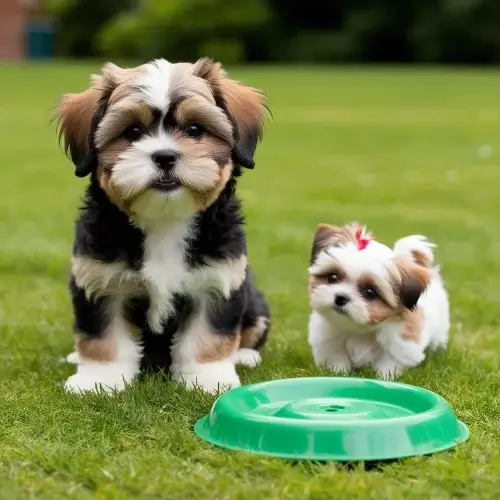
How Long Does It Take to Potty Train a Shih Tzu Puppy?
Factors That Influence Potty Training Time
The time it takes to potty train a Shih Tzu puppy varies based on their age, routine, and your consistency. On average, it can take a few weeks to a few months to establish good habits.
With consistent effort, positive reinforcement, and a structured schedule, progress happens faster.
“Effort today leads to a lifetime of good habits,” I like to say.
Potty Training Summary
| Key Aspect | Tips |
| Patience | Use encouraging tones. Avoid punishment. |
| Routine | Feed and potty at the same times daily. |
| Signals | Watch for sniffing, circling, or whining. |
| Commands | Use consistent phrases like “go potty.” |
| Positive Reinforcement | Praise with happy tones and offer treats. |
| Avoiding Mistakes | Don’t overfeed or scold for accidents. |
| Common Challenges | Manage excited urination and resistance to outdoor pottying patiently. |
Final Thoughts
Shih Tzu Potty training might feel overwhelming, but patience, consistency, and positive reinforcement will make it a rewarding journey. With the steps outlined here, you’ll help your puppy develop habits that last a lifetime.
Celebrate small successes, stay committed to routines, and always approach training with love. Your Shih Tzu will not only learn where to potty but also build a stronger bond with you.
FAQs
How can I use positive reinforcement for Shih Tzu potty training?
Use positive reinforcement by praising your Shih Tzu in a happy tone or offering treats immediately after they potty in the right spot. This method encourages repeat behavior and is a proven positive reinforcement for potty training.
What is a Shih Tzu potty training schedule for young puppies?
A Shih Tzu potty training schedule should include bathroom breaks every 1-2 hours, especially after meals, play, and naps. As they grow, you can gradually extend the intervals between potty trips.
Are there specific potty training tips for Shih Tzu puppies?
Key potty training tips for Shih Tzu puppies include identifying signals like sniffing or circling, using consistent commands like “go potty,” and rewarding success promptly. Avoid punishment for accidents as it creates fear.
How long do Shih Tzus typically take to potty train?
Most Shih Tzus take a few weeks to a few months to potty train, depending on their age and routine. Consistency and an effective puppy potty training routine can speed up the process.



